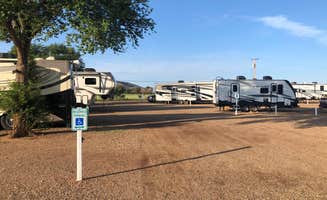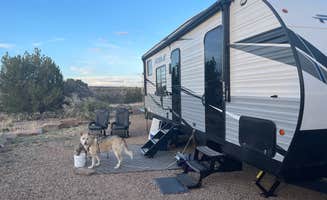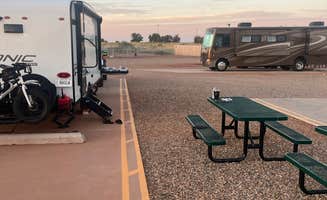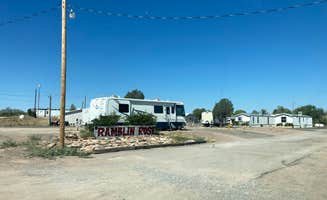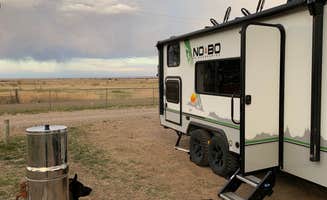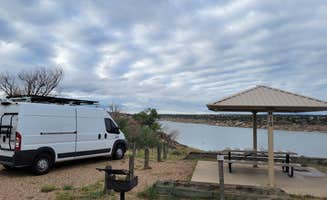Conchas Lake State Park lies in northeastern New Mexico at 4,200 feet elevation, with the lake formed by Conchas Dam on the Canadian River. The area experiences hot summers with temperatures regularly reaching 90°F and cool winters where nighttime temperatures drop below freezing. Seasonal monsoons typically arrive in July and August, bringing afternoon thunderstorms that create challenging conditions for tent campers.
What to do
Water activities at Ute Lake: Located about 45 miles east of Conchas Dam, Logan Park at Ute Lake State Park offers multiple recreation options. "When the wind kicks up it can get pretty rough but overall nice. The grounds are well taken care of as well," notes Ricky B. The park includes a 2.4-mile nature trail with lake viewing areas.
Birding near water sources: Many campgrounds in the region provide opportunities to spot native birds, particularly during migration seasons. "Bird watching is fantastic!" according to Scooter M., who visited Ute Lake. Wildlife regularly visits camping areas, with one camper at Santa Rosa Lake mentioning "beautiful area with lots of wildlife walking through the campground."
Route 66 exploration: Tucumcari, located 45 miles south of Conchas Dam, serves as a gateway to historic Route 66. "We toured Tucumcari and saw a few neat murals but this little Route 66 town has seen better days," reports MickandKarla W. when staying at Blaze-In-Saddle RV Park. The town preserves several historic landmarks and vintage signage from the highway's heyday.
What campers like
Uncrowded weekday camping: Several Conchas Dam area campgrounds experience significant fluctuations between weekend and weekday use. At Conchas Lake, one reviewer noted, "The weekends usually have a lot of people that disappear during the week." This creates opportunities for midweek visitors seeking quieter experiences.
Covered picnic areas: Rocky Point Campground at Santa Rosa Lake State Park provides sheltered dining spaces. "Most sites have a covered picnic table and grill," according to Scott D. Another camper mentions that "each site has a covered area with a picnic table and grill. Plenty of room."
Reliable internet connectivity: Despite remote locations, some campgrounds maintain functional connectivity. "ATT signal is good and Starlink worked great here, no interruptions in school, work, streaming or gaming," notes a camper who stayed at Cove Campground in Conchas Lake State Park. AT&T service at Ute Lake was rated as "really good, with 4 Bars of LTE service and speeds up to 27 MB/s."
What you should know
Water availability fluctuates: Infrastructure maintenance impacts water service at campgrounds throughout the region. At Conchas Lake's Bell Point campground, one camper reported, "water was unavailable due to repairs, the dump station and showers were closed - making our stay shorter than expected." The nearest water source was in Tucumcari, a 30-minute drive away.
Sand burrs in natural areas: The native vegetation harbors troublesome seed pods that attach to clothing, gear, and pets. A reviewer at Ute Lake warns: "be advised, the evil little things are everywhere and imbed themselves in everything." Dog owners should inspect paws regularly and bring tweezers for removal.
Seasonal bathroom closures: Many RV parks and campgrounds near Conchas Dam limit facility access during winter months. A visitor to Mountain Road RV Park in Tucumcari noted the heat in restrooms was "great in the 30 degree weather outside." Another camper at Ute Lake found that "the actual bathrooms are closed for the winter" during their visit.
Tips for camping with families
Check playground availability: Several campgrounds feature dedicated play areas for children. "The playground was very nice and shaded," reports one visitor to Ute Lake. Facilities with playgrounds allow children to burn energy without disturbing other campers.
Consider wildlife viewing opportunities: The area around Conchas Dam supports diverse wildlife populations that appeal to young nature enthusiasts. "We saw a roadrunner near our site which was really neat," mentions one family staying at Conchas Lake State Park. Deer sightings are common, with one camper noting "deer cover the campground" at Bell Point.
Prepare for tent pad challenges: Rock and gravel tent pads at many campgrounds create difficulties for securing shelters. Jesse H. at Conchas Lake observed that "the tent pads were rock and gravel making it very difficult to stake a tent." Bring heavy-duty stakes or alternative anchoring methods for high-wind conditions.
Tips from RVers
High water pressure concerns: Multiple RV parks in the region maintain unusually high water pressure that can damage RV plumbing. At Blaze-In-Saddle RV Park in Tucumcari, Semi H. warns: "High water pressure: do install a pressure reducer. I've seen firsthand people blowing out their water lines here." Another RVer confirms: "Their water pressure is around 90 psi and had to use our pressure regulator directly on their faucet."
Electrical capacity limitations: Some parks experience inconsistent power output during peak usage periods. A camper at Ute Lake noted: "We were disappointed that the electrical hookups did not provide consistent output. We were unable to run our AC while the refrigerator was on, and the other camper we spoke to had the same issues."
Level parking surfaces: Many RV parks near Conchas Dam feature level, pull-through sites that accommodate overnight stays without disconnecting tow vehicles. Tony S. describes Mountain Road RV Park as having "level and wide sites," while another reviewer confirms the "pull-through spots were long enough to leave the truck attached to the camper for the one night."


